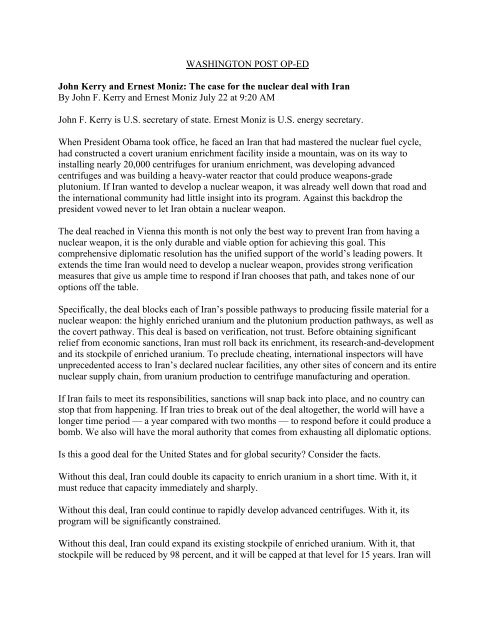WHAT YOU NEED TO KNOW ABOUT THE JCPOA
jcpoa_what_you_need_to_know
jcpoa_what_you_need_to_know
Create successful ePaper yourself
Turn your PDF publications into a flip-book with our unique Google optimized e-Paper software.
WASHING<strong>TO</strong>N POST OP-EDJohn Kerry and Ernest Moniz: The case for the nuclear deal with IranBy John F. Kerry and Ernest Moniz July 22 at 9:20 AMJohn F. Kerry is U.S. secretary of state. Ernest Moniz is U.S. energy secretary.When President Obama took office, he faced an Iran that had mastered the nuclear fuel cycle,had constructed a covert uranium enrichment facility inside a mountain, was on its way toinstalling nearly 20,000 centrifuges for uranium enrichment, was developing advancedcentrifuges and was building a heavy-water reactor that could produce weapons-gradeplutonium. If Iran wanted to develop a nuclear weapon, it was already well down that road andthe international community had little insight into its program. Against this backdrop thepresident vowed never to let Iran obtain a nuclear weapon.The deal reached in Vienna this month is not only the best way to prevent Iran from having anuclear weapon, it is the only durable and viable option for achieving this goal. Thiscomprehensive diplomatic resolution has the unified support of the world’s leading powers. Itextends the time Iran would need to develop a nuclear weapon, provides strong verificationmeasures that give us ample time to respond if Iran chooses that path, and takes none of ouroptions off the table.Specifically, the deal blocks each of Iran’s possible pathways to producing fissile material for anuclear weapon: the highly enriched uranium and the plutonium production pathways, as well asthe covert pathway. This deal is based on verification, not trust. Before obtaining significantrelief from economic sanctions, Iran must roll back its enrichment, its research-and-developmentand its stockpile of enriched uranium. To preclude cheating, international inspectors will haveunprecedented access to Iran’s declared nuclear facilities, any other sites of concern and its entirenuclear supply chain, from uranium production to centrifuge manufacturing and operation.If Iran fails to meet its responsibilities, sanctions will snap back into place, and no country canstop that from happening. If Iran tries to break out of the deal altogether, the world will have alonger time period — a year compared with two months — to respond before it could produce abomb. We also will have the moral authority that comes from exhausting all diplomatic options.Is this a good deal for the United States and for global security? Consider the facts.Without this deal, Iran could double its capacity to enrich uranium in a short time. With it, itmust reduce that capacity immediately and sharply.Without this deal, Iran could continue to rapidly develop advanced centrifuges. With it, itsprogram will be significantly constrained.Without this deal, Iran could expand its existing stockpile of enriched uranium. With it, thatstockpile will be reduced by 98 percent, and it will be capped at that level for 15 years. Iran will


